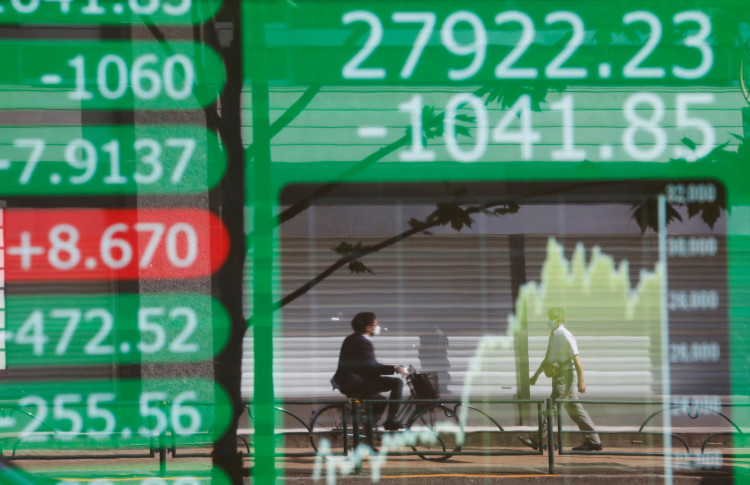Japanese stocks plummeted nearly 6% on Friday, marking the Nikkei 225's most significant daily drop since the onset of the pandemic in March 2020. The sharp decline comes as global markets are beset by anxieties over the US economy, coupled with anticipations of further interest rate hikes from the Bank of Japan (BOJ).
The Nikkei 225 concluded the day 5.8% lower, extending a global stock rout that was ignited by the release of lackluster US economic data. The Japanese benchmark had already shed 2.5% on Thursday, culminating in its lowest close since January. European markets mirrored this downward trajectory on Friday, with the Stoxx Europe 600 index dropping 1.4%, Germany's DAX down 1.2%, France's CAC 40 falling 0.6%, and London's FTSE 100 dipping 0.4%. US futures indicated another weak opening for Wall Street, with S&P 500 futures down 0.9%.
The BOJ, in a surprising move, raised interest rates by 15 basis points to 0.25% on Wednesday-its second hike this year-and announced plans to taper its bond-buying program. "The BOJ made a hawkish shift after its surprising 15 basis point rate hike," noted Ken Cheung, director of foreign exchange strategy at Mizuho Securities. He added, "Importantly, the BOJ flagged the inflation upside risks and left the door open for further rate hikes."
This rate hike has narrowed the interest rate gap between the United States and Japan, causing the Japanese yen to appreciate against the dollar. Since mid-last month, the dollar has fallen more than 4% against the yen, weakening further to 148.9 yen on Friday, down 0.3%.
"The risk of rising yen volatility threatens the decade-long bull market of Japanese equities," remarked Frank Benzimra, head of Asia equity strategy at Societe Generale. He warned that a rapid yen appreciation could adversely impact profits for Japan's exporters.
Over the past four years, the yen has weakened significantly, falling 40% against the US dollar and 30% against the euro. This depreciation, along with robust corporate earnings and effective governance reforms, propelled the Nikkei 225 to record highs earlier this year. However, the recent strengthening of the yen has led to a correction in Japanese equities, with the Nikkei down 12% since July 12.
Citi analysts expressed a cautiously optimistic view, stating, "From a Japanese equity perspective, the earnings boost from a weak yen is set to diminish." However, they remain positive about Japanese stocks in the long run, citing increasing inflation and a positive "wage-price spiral" as beneficial factors for the economy's future.
Across Asia, markets tumbled on Friday. South Korea's Kospi dropped 3.7%, Australia's S&P/ASX 200 declined 2.1%, Hong Kong's Hang Seng Index fell 2.1%, and China's Shanghai Composite dipped 0.9%. The decline in Asian markets followed a rough night on Wall Street, where the Dow Jones Industrial Average slid 1.2%, the S&P 500 lost 1.4%, and the Nasdaq Composite fell 2.3%.
New economic data in the US revealed an uptick in jobless benefit applications, rising to 249,000 last week-the highest since August. Continuing claims, which reflect the number of people receiving unemployment benefits for at least a week, jumped to 1.877 million, the highest since November 2021. ANZ analysts commented on Friday, "Markets firmed up expectations of rate cuts as weak manufacturing data showed the US economy is meaningfully slowing," predicting that the Federal Reserve might enact three rate cuts this year.
In a stark shift, Japan's stock markets have hit an eight-month low, with the Nikkei 225 tumbling 5.81% to end at 35,909.7, its worst day since March 2020, according to Factset data. The broader Topix index saw a more significant loss, dropping 6.14%, marking its worst day in eight years.
This dramatic decline contrasts sharply with the market's performance less than a month ago when the Nikkei reached an all-time closing high of 42,224.02 on July 11. Bruce Kirk, chief Japan equity strategist at Goldman Sachs, told CNBC's "Squawk Box Asia," "So yes, it's very painful. Yes, there's a fundamental shift taking place in the market, but it's not unusual."
Kirk attributed the rally over the past two years to three main factors: yen weakness benefiting blue-chip exporters and banks, expectations of monetary policy normalization, and corporate governance reform. "The rules of the game have definitely changed, particularly around rates and FX," Kirk noted, adding that investors are now reassessing their market positions.
Despite the turmoil, there is a silver lining. Kirk mentioned that investor interest in Japan's small- and mid-cap companies is rising due to their higher exposure to domestic demand and reduced vulnerability to foreign exchange fluctuations. He observed, "I think people are now looking for areas that are more domestic demand focused, and that's really putting the interest back on Japan's small and mid-caps."
Kirk also highlighted the crowded nature of the market, where investors had heavily invested in a narrow group of companies. "Everybody's on the same side of the boat when some of the fundamentals change. That's when you do see these very aggressive pullbacks and reversals."
Reflecting on the market's past performance, Kirk noted that over the last two years, there have been about seven "momentum pullbacks," with the market usually taking about two months to recover from each. The current price action resembles the market's reaction in December 2022, when the BOJ modified its yield curve control policy, eventually abandoning it in March.
CNN and CNBC contributed to this report.






